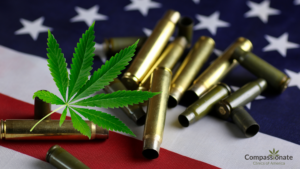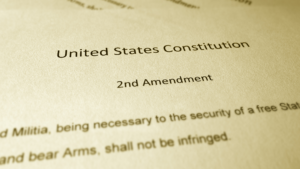Medical Marijuana and Gun Ownership: An Explainer
In recent years, the topic of medical marijuana and gun ownership has sparked intense debate and confusion for those who have a medical marijuana card, or are considering getting one.
As the medical marijuana population continues to grow across multiple states that now have medical marijuana programs, understanding how existing gun laws intersect with medical cannabis use is important, especially amid ongoing discussions on national gun reform.
The question on many medical marijuana patients’ minds is: Do you lose your gun rights if you have a medical card? While the issue itself is complex, the short answer is essentially “No… but…” Obtaining a medical marijuana card in your state will not result in losing your guns or right to bear arms, however, the issue isn’t totally cut and dry and can be complex when it comes to federal laws.
At Compassionate Clinics of America, it’s important to us that we provide patients with information on medical marijuana and gun ownership, and how getting a medical cannabis card can affect many aspects of their lives, including their Second Amendment rights.
In this explainer article, we will delve into these points and provide insight into federal regulations on possessing firearms and medical marijuana cards. This is not to be taken as legal advice, and we recommend you seek out information on your own state laws or legal advice of your own if you are concerned about the gun rights of medical patients.
Medical Marijuana and Gun Ownership & Cannabis as a Controlled Substance
Throughout the decades, federal laws have laid the foundation for the complex relationship between firearm ownership and medical marijuana. The federal Gun Control Act of 1968 specifically prohibits individuals using any controlled substance from possessing guns or ammunition.
The federal government maintains a clear stance on medical marijuana and its impact on gun ownership. The FDA’s classification of cannabis as a Schedule 1 controlled substance within the federal Controlled Substances Act deems it to have no recognized medical value and high potential for abuse (something we certainly don’t agree with at Compassionate Clinics of America), and as a result, both possession and use are considered illegal.
In 2011, the Federal Bureau of Alcohol, Tobacco, Firearms, and Explosives (ATF) issued a letter to all licensed firearms dealers stating that marijuana cardholders cannot purchase firearms at gun stores.
Gun Ownership: A Federal Crime for Medical Marijuana Cardholders?
In the legal case of Wilson v. Lynch, the United States Court of Appeals for the Ninth Circuit made a significant ruling stating that registered medical marijuana users cannot legally purchase firearms under federal law. Despite this restriction, the court determined that such a prohibition did not infringe on the Second Amendment rights of medical users.
Following the Wilson v. Lynch case, the ATF issued a second warning to address the matter, including a question about cannabis use in the Form 4473, a questionnaire that prospective gun owners must complete before purchasing a firearm, stating: “The use or possession of marijuana remains unlawful under Federal law regardless of whether it has been legalized or decriminalized for medicinal or recreational purposes in the state where you reside.”
The question proved to be quite the Catch-22 for those with a medical marijuana card: Answering “Yes” to this question would result in the individual being ineligible to lawfully possess a firearm, while falsely claiming not to use cannabis while possessing a medical card would constitute perjury, which is a punishable crime.
Medical Marijuana Cards and Firearm Licenses
The possession of a medical marijuana card essentially nullifies any firearm license you may hold, placing individuals in a frustrating predicament if they already own a gun.
The enforcement of this regulation varies depending on the circumstances, and while the Gun Control Act‘s language is clear, the evolving acceptance and legal status of cannabis have rendered its enforcement pretty much impossible.
For instance, when you see an armed security guards at dispensaries, they are technically committing a federal crime by being near cannabis. Most law enforcement will not take legal action against dispensaries or those with a medical card in the interests of protecting their state cannabis markets.
To add to the complexity in the issue of medical marijuana and gun ownership, there is no clear guidance on how to handle your existing gun when you get your medical marijuana card, and relinquishing it may expose you to potential prosecution. Another Catch-22!
Federal Law and State Law for Medical Marijuana and Gun Ownership
Several states have enacted their own laws in response to this ruling of federal law, both assisting medical marijuana patients in enacting their gun rights and further squashing them.
For instance, both Oregon and Arkansas recently passed legislation authorizing marijuana patients to obtain a concealed carry license, while Florida has ruled that medical patients or those who use other controlled substances cannot legally purchase firearms.
It’s essential to remember that federal law takes precedence over state laws, regardless of any specific legislation a state may have enacted regarding gun ownership and medical cannabis. Even if marijuana laws in a state deem it legal, federal law classifies it as a narcotic drug (Schedule I Drug). This dynamic creates a complex and evolving legal landscape for those navigating this subject.
Federal law makes it a requirement for licensed weapons dealers to perform a background check on anyone purchasing a gun, however, a good portion of gun purchases in this country are from an unlicensed gun dealer who may not perform this task when they sell firearms, or some people obtain firearms illegally.
To put it simply, individuals with medical marijuana cards are restricted to purchasing firearms solely from private sellers. Attempting to obtain a firearm through a federal firearms dealer or a retail location is considered illegal for those holding a medical card.
Caregivers for Medical Marijuana Patients/Spouses and Gun Rights
Since medical cardholders are violating federal law if they are buying firearms from a federal dealers, what about their spouses or caregivers?
It is permissible in most states for an individual to possess firearms despite their spouse or significant other holding a medical card. Likewise, one can hold a medical marijuana card if their spouse is a gun owner. Technically, however, the spouse must keep it locked where the medical marijuana patients cannot access it.
In most states, the ownership of a gun permit does not preclude a person from acting as a caregiver for someone requiring medical marijuana. Therefore, individuals who are gun permit holders can still fulfill the role of a caregiver for those in need of medical marijuana.
While these are just general guidelines, we always recommend you thoroughly research medical marijuana and gun ownership within your own state law.
A Complicated, But Evolving Issue
The pressure continues to be put on the Biden administration to legalize marijuana on the federal level, which could significantly change legislation on medical marijuana and gun ownership.
The bottom line is that medical marijuana and gun ownership is a complicated and complex issue. In this article we have provided you with a very brief overview of medical cards and gun ownership. This is not intended to be legal advice, however, when you contact us about getting your medical marijuana card in your state, we will be happy to help you navigate your particular situation as it pertains to your medical cannabis card and your gun rights.
Reach out to us today to discuss getting your medical cannabis card in Arizona, Arkansas, California, Connecticut, Delaware, Georgia, Illinois, Iowa, Louisiana, Maine, Maryland, Massachusetts, Michigan, Minnesota, Missouri, Montana, Nevada, New Jersey, New York, Ohio, Oklahoma, Pennsylvania, Texas, Utah, Vermont, Virginia, & West Virginia,. We provide 100% approval and help you through the process of getting a medical cannabis card in your state and getting on a new path to health and well-being.



























